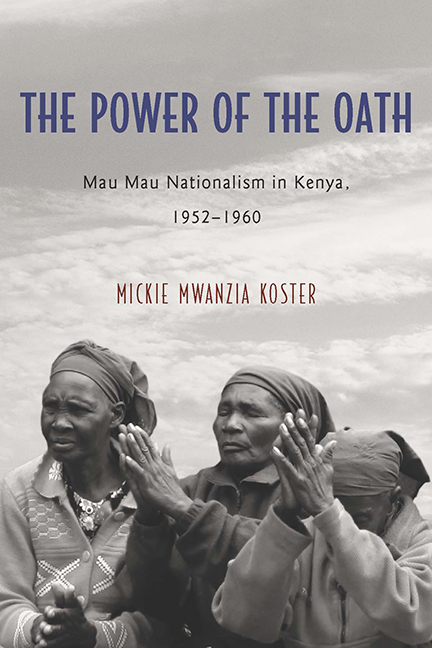4 - Shifting from Lawful to Unlawful: Mau Mau Oath Criminalization
Published online by Cambridge University Press: 07 May 2022
Summary
You take the oath to stand by the truth.
—Makau, July 2011During the emergency period, the British criminalized the Mau Mau oath. This new criminal relationship changed the oath experience, making it even more deadly and secretive. Prior to the 1950s, oathing worked along with elders and political structures to enforce righteousness and order in Kenya; it was never viewed as an unlawful activity. Oathing during this period was honorable and promoted truth. However, the Mau Mau war marked a significant shift, forever changing the image and honor once connected with oathing. During the Mau Mau period, the nature and perception of oathing spiraled downhill, creating a criminalized oath that is still prevalent. In Kenya today, oathing is viewed as an act of criminality associated with disorderly thugs, hoodlums, and outcasts. Although this criminal perception has been reinforced based on the contemporary oathing activities of the Mungiki movement as discussed earlier in this study, it was a view embedded in the legal system that was invented and shaped during the hysteria of the 1950s to suppress Mau Mau oathing.
The colonial administration held the power to invent and reinvent legalities to satisfy colonial economic goals, interests, and African domination. The colonial law practices were not created in a vacuum, but were also used by Africans over time to promote desires and to contest colonial maneuvers. Despite these contentions, colonial justice was a powerful mechanism that established new societal boundaries, discipline, and order to support primarily metropolitan economic and “civilizing” goals. According to Robert Seidman, British imperialism had two mandates: “to benefit England's economy and to uplift the savage races.” Therefore, the strict colonial policing of the nearly 8.6 million Africans was designed primarily to control their actions and protect the white settler population of 53,000. Under British rule, Kenya was heavily policed. In the period from 1950 through 1962, over 99 percent of the jails were filled with Africans. In the domain of the colonial courts, the assessors and ultimately the judge decided on innocence and guilt; they became the gatekeepers of colonial justice.
- Type
- Chapter
- Information
- The Power of the OathMau Mau Nationalism in Kenya, 1952–1960, pp. 81 - 102Publisher: Boydell & BrewerPrint publication year: 2016

